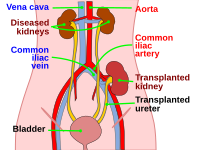
Photo from wikipedia
The efficacy of the inactivated severe acute respiratory syndrome coronavirus 2 (SARS‐CoV‐2) vaccine has not been fully elucidated across the whole spectrum of patients on kidney replacement therapy. We aimed… Click to show full abstract
The efficacy of the inactivated severe acute respiratory syndrome coronavirus 2 (SARS‐CoV‐2) vaccine has not been fully elucidated across the whole spectrum of patients on kidney replacement therapy. We aimed to characterize the long‐term antibody response of inactivated SARS‐CoV‐2 vaccine administered in kidney transplant recipients (KTRs) and hemodialysis (HD) patients. We performed this prospective observational study in 50 HD, 64 KTR, and 41 healthy control groups (HG) given two doses of CoronaVac. We measured anti‐Spike antibodies after 28 days of every vaccine dose, 3rd and 6th months after the first dose, and compared them between cohorts. After two doses, an anti‐spike immunoglobulin G of ≥50 AU/ml was present in HD, KTR, and HG as 44%, 7.2%, and 58.5%, respectively (p < 0.001). Furthermore, the proportion of antibody titers peaked at 86.5%, 23%, and 97.6% (p < 0.001) at the 3rd month and decreased significantly at the 6th month in most HD and HG participants, whereas this effect was not observed in KTRs from basal until the 6th month (p < 0.001). During the follow‐up, the incidence of coronavirus disease 2019 disease was higher (p < 0.003) in KTRs compared to the other groups, but there was no requirement for an intensive care unit and no death was recorded. We found a negative correlation between antibody seroconversion and age (p < 0.016). The antibody response following inactivated vaccine in dialysis patients is almost comparable to controls for 6 months. In contrast, kidney transplant patients have a poor response. These findings reinforce the need to discuss the vaccination strategy in immunocompromised patients, including the third dose with homologous or heterologous vaccines.
Journal Title: Journal of Medical Virology
Year Published: 2022
Link to full text (if available)
Share on Social Media: Sign Up to like & get
recommendations!